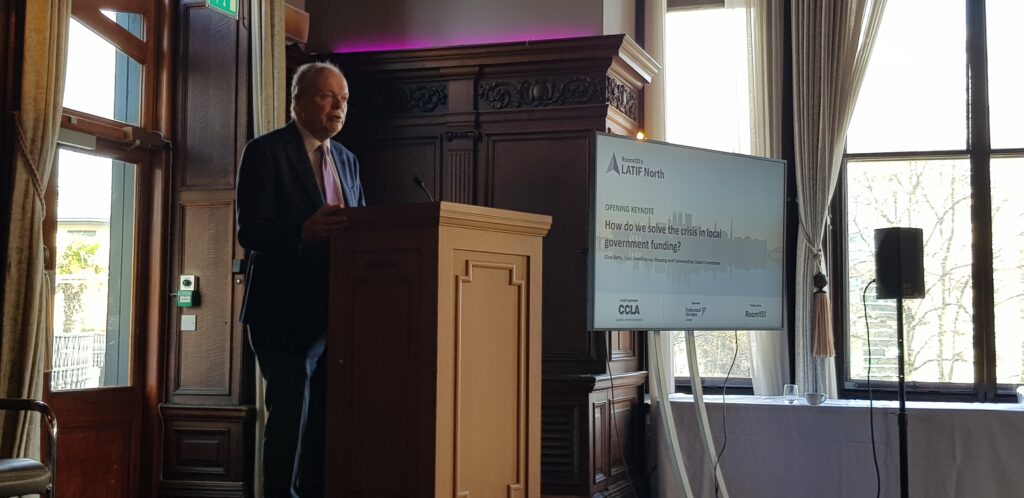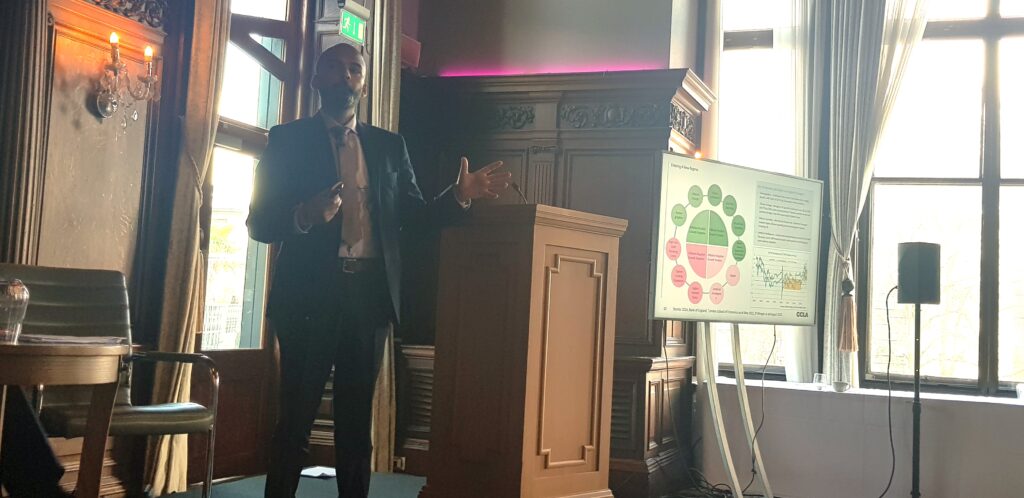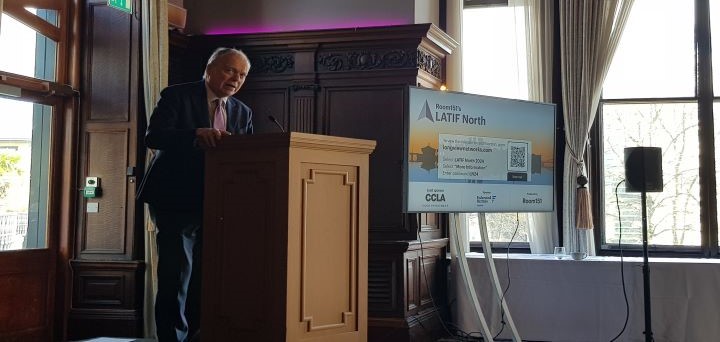Innes Edwards, principal treasury and banking manager at City of Edinburgh Council, opened up the LATIF North conference by highlighting the “dire state” of local government, with 19 councils granted exceptional financial support to ward off section 114 notices.
Delivering the keynote speech of the conference was Clive Betts, chair of the Levelling Up, Housing and Communities Committee.
Betts warned that the next parliament will be “challenging”, suggesting that in the Spring Budget, announced earlier this month, the Department for Levelling Up, Housing and Communities’ (DLUHC’) spending profile did not increase, which will have “ramifications” for councils including real terms cuts.

He stated that “despite no one willing to commit to it before the next general election”, councils will need “additional and immediate financial support”. Alongside this, multi-year funding settlements and greater devolution should be priorities.
In his speech, Betts stated that the “whole funding system for local government” needs a review, with the Labour Party looking to review business rates and council tax. He stated that having a Scandinavian system for council tax “ought to be considered”.
Alongside this, the select committee chair also suggested that adults’ and children’s social care costs are another area which must be addressed, with a potential solution being making it a separate funding stream.
A ‘new normal’ for interest rates
Much of the rest of the first session of LATIF North focused on macro economic trends. First, Sidhant Mehta, portfolio manager (cash) at CCLA looked at where UK interest rates might go based on where they are now and how we got to this point – with 200 years of data feeding into his analysis.
The UK economy is in a “fundamentally different” place now than where it was in the pre-Covid world, Mehta stated. Interest rates are up to 5.25% – but, noted Mehta, they used to be in double digits, so is there a need to cause a fuss?
The answer is yes, as there is a clear impact on day-to-day costs. Historically, interest rates never dropped below 2%, with this “unspoken rule” only broken in 2008. That means the post-financial crisis era is the anomaly in the wider historical context.
Interest rates were lowered by central banks to avoid a global depression and as part of quantitative easing policies. While this generally worked, Mehta noted a “shift away from this playbook” over the past few years, and a “shift to the opposite” policy. This should lead to a “new era” for UK interest rates, he believes.
Mehta’s macro economic update then looked at likely themes that will play out in the UK economy over the next few years. One is demographics as an inflationary driver. Its impact has accelerated after the Covid crisis, with the UK’s labour force supply shrinking and now growing at a much slower rate. This leads to wage inflation and skills shortages.
Other themes include the continued impact of climate change, and increases in defence and welfare spending. The overall result is that we are “likely to see a new environment where interest rates will be higher for longer”, with this situation becoming the “new normal”.
In the short-term, Mehta says the UK is unlikely to see a deeper recession; instead working its way slowly out of it and “into a phase of stagnation to very low growth”. There are “green shoots” of positivity and signs of real wage growth.
Even in the worst-case scenario of the UK going into a recession, while the Bank of England would be forced to act it would have a lot more options now to reduce interest rates. “We don’t have to go back to the old regime,” he concluded.

Higher for longer
LATIF North continued with a macro & markets panel featuring Mehta and Laura Coroneo, professor of economics at the Department of Economics and Related Studies, University of York. The pair assessed the outlook for the economy and markets in this election year.
Coroneo analysed the current situation with interest rates, noting the Bank of England Monetary Policy Commission’s recent stated need to keep interest rates higher, while pointing out the importance of inflation expectations.
She also looked at the outlook both globally and in the UK to provide context. Inflation has been slower in the UK than the US, for example, but peaked at a much higher level. Inflation in the UK is going down, but the rate at which it stabilises will slow down too, she said.
Factors affecting the global outlook include sticky inflation expectations; the possible impact of international conflicts and energy prices; disruptions to global shipping routes; and the volatility of inflation.
There is “potential for central banks to keep interest rates higher for longer”, she said, echoing Mehta’s sentiments.
Factors affecting the UK outlook include increased uncertainty from elections; the continuing post-Brexit impact; policy implications; trade agreements; and regulatory changes. All of these have had negative effects on interest rates, exchange rates and volatility.
Coroneo concluded by looking at possible opportunities, while noting that keeping interest rates higher means a higher cost of borrowing and slower economic growth. A shift in policies might be needed. “The next government will be crucial to decide what’s going to happen in the next five to ten years,” she said. New policies should “reduce uncertainty and sustain long-term growth without fuelling inflation”, while she encouraged investment in the labour force to help achieve these aims.
Mehta noted macro economic influences such as the UK and US elections; sticky wage inflation and what this might do to the Bank of England’s plan to reduce interest rates; and a possible impact from the Middle East.
“2024 is a story of disinflation and continued wage growth,” he concluded. “We are in a transitionary stage before we get to normalisation, which may occur in 2025.”
Decreasing balances
Following on from macro panel was the first interactive panel of the day, which was kicked off by Kelly Watson, head of local government relationships at CCLA, where she asked delegates a series of questions.
When asked the question on how the current economic conditions are impacting local authorities’ investments, 90% of delegates voted that it is decreasing their balances.
In addition, an overwhelming majority of the audience (70%) voted that they expect interest rates to be at 4% in 12 months’ time, with 28% suggesting it could be at 5%.
A full round-up of the LATIF North conference is available to read here.
—————
FREE bi-weekly newsletters
Subscribe to Room151 Newsletters
Follow us on LinkedIn
Follow us here
Monthly Online Treasury Briefing
Sign up here with a .gov.uk email address
Room151 Webinars
Visit the Room151 channel













